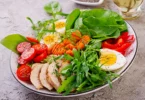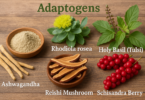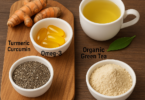The call arrived at 2 AM. My friend He, a 47-year-old marketing executive, was in the emergency room, certain he was having a heart attack. Hours of medical tests turned up no cardiac problems, only another intense anxiety attack, his third that month. “I can’t live like this anymore,” he said to me the following day over coffee, still shaking a little with aftershock. His doctor had prescribed medication and a course of meditation, but He was hoping for more solutions. That’s when I told him how foods that reduce anxiety had changed my own mental health strategies.
Like many professionals in their 40s with career highs and family obligations, He had never even thought about the possibility that foods he ate every day might be fueling his anxiety. The discovery that there are foods that lower anxiety that can be used in conjunction with his treatment plan was a ray of hope he hadn’t experienced in months
The Science of Anxiety and Nutrition

The gut and brain relationship isn’t a myth, it’s a scientific fact. Research from the Harvard Review of Psychiatry estimates that the gut contains about 90% of serotonin receptors, which experts refer to as the “gut-brain axis” that directly affects mood and anxiety The “highway of biology” is why what we eat so profoundly impacts the way we feel.
In their 40s, for adults, this relationship becomes more relevant since:
• Metabolic changes affect the way our bodies utilize nutrients
• Chronic stress erodes vital mood-affecting vitamins and minerals
• Poor eating habits can cause inflammation, which can worsen anxiety symptoms
• Fluctuating hormones heighten susceptibility to dietary triggers
Groundbreaking research by the Journal of Nutritional Neuroscience discovered that those who adhered to anti-inflammatory eating habits experienced a 35% decrease in the symptoms of anxiety than control subjects. Research by the American Journal of Clinical Nutrition also proved that eating folate-containing foods boosted the response to treatments of anxiety.
The Food-Mood Connection
I slid a small bowl across the table to him during our break. It contained a plain meal: walnuts, avocado, dark greens, and a piece of salmon.
“You are expecting me to believe that this will do more for me than my medication?”
“In addition to it,” I said. “These are the foods that lower anxiety based on evidence, not Instagram wellness experts.”
He boasted an analytical mind and resolved to treat this as he would any business problem with research and quantifiable outcomes. He downloaded a mood-tracking app and embarked on a six-week trial involving the integration of anxiety-reducing foods in daily meals.
His teenage daughter had even begun to notice the change by week three. “Dad, you have not snapped at anyone during dinner all week,” she said with characteristic teenage honesty. The fridge and pantry in the house now felt like a different world colourful fruits, fatty fish, nuts, seeds, and fermented foods had pushed out their processed counterparts.
Healthy Foods That Help Alleviate Anxiety
Complex Carbohydrates: The Serotonin Connection
He learned that complex carbohydrates cause the body’s production of serotonin, the relaxing neurotransmitter targeted by anti-anxiety drugs. The following are his new staples:
• Whole grain oats (daily breakfast with berries and cinnamon)
• Roasted sweet potatoes (olive oil and rosemary, twice a week)
• Quinoa (instead of white rice for most meals)
• Lentils and chickpeas (used in salads and soups)
“I used to crash every day at 3 PM,” He explained. “Now my energy is level, and those panic-causing blood sugar dips have almost eliminated themselves.”
Omega-3 Rich Foods: Brain Food at Its Best

The studies for omega-3 fatty acids for the mind even convinced skeptical He:
• Wild-caught salmon (two times a week)
• Walnuts (daily handful as snack)
• Ground flaxseeds (added to breakfast oatmeal)
• Chia seeds (in puddings and smoothies)
By using these regularly, he realized that he was becoming much calmer during racing thoughts, particularly during guided meditations for anxiety. “For the first time,” he said to me, “I can get through an entire meditation without my mind hijacking the process.”
Magnesium-Rich Foods: Nature’s Relaxant

His nutritionist told him that a lack of magnesium is prevalent in adults under chronic stress, leading to a vicious circle of deficit and heightened anxiety. His new magnesium-laden favorite foods included:
• Leafy dark greens (as a daily salad or sautéed as a side)
• Avocados (several times per week)
• Dark chocolate (one small 70%+ cacao square as a daily snack)
• Toasted pumpkin seeds (as an addition to salads)
“The dark chocolate had been the most straightforward prescription I’d ever adhered to,” he joked. But the outcome wasn’t humorous, it had been life-changing.
The Meditation-Diet Relationship
One of the surprising advantages he found was the way that foods which decreased anxiety improved the quality of his guided meditations for anxiety practice. “It was as if my mind at long last had the raw material it required to relax,” he told his group one night.
His nutritionist outlined the biochemistry: specific nutrients such as magnesium, B vitamins, and omega-3s are essential for the production of neurotransmitters and nervous system health. When there is an abundance of such nutrients, the brain can more easily make relaxing chemicals and healthier neural pathways.
He discovered that timing his guided meditations for anxiety sessions a little over an hour after eating foods with such nutrients dramatically enhanced their effect. “It’s synergistic,” he told a colleague who had commented on the change. “The nutrition primes the biochemistry, and the meditation capitalizes.”
Meditation for Sleep: The Nighttime Reset
Breaking the Insomnia Cycle
His most striking gain was in the quality of sleep, no longer plagued by 3 AM ruminative spirals that made him irritable and fatigued. He now maintained an evening routine of integrating certain foods with sleep-conducive meditation:
- A light evening snack of foods with tryptophan (turkey, banana, or yogurt)
- Chamomile tea with raw honey
- A 15-minute guided sleep meditation
- Complete darkness and room temperature
“I used to believe guided meditations for anxiety were trendy nonsense,” he confessed. “Now they’re part of my must-haves for my mental health, particularly for sleep.” The pairing of anti-anxiety foods and specific sleep meditation put him back to the level of quality night’s sleep he had not known since he was in his thirties
The Gut-Brain Revolution
One of the most surprising things he learned was the significance of gut health in managing anxiety. The research now proves that the gut microbiome directly affects the way the brain functions by way of the vagus nerve, a superhighway of information between the nervous and digestive systems.
He included the following gut-friendly foods:
• Fermented foods such as kimchi, sauerkraut, and kefir
• Whole grains, fruits, and vegetables rich in fiber
• Prebiotic foods such as garlic, onions, and Jerusalem artichokes
• Anti-inflammatory spices such as ginger and turmeric
Within a few months, the guided meditations for anxiety worked even more powerfully as his gut health got healthier. “It’s like my mind and my body are now working together as a team,” He noted during one of our then-frequent lunchtime get-togethers, during which I’d become something of a wellness coach for him.
Men, Women, and Nutritional Needs for Anxiety
When he shared with colleagues, we observed an interesting trend: While basic principles applied across the board, there were distinctive differences depending on gender for what seemed most effective.
Foods rich in B vitamins and zinc had especially prominent anxiety-reducing activity for the men in his peer group, possibly because of the involvement of those nutrients in the synthesis of testosterone and stress resistance. For many of them, guided meditations for anxiety worked much more effectively once nutritional insufficiency was treated.
Women in their 40s who had colleagues also found that magnesium-dominant foods and those that promote estrogen metabolism seemed to relieve anxiety the most, particularly during hormonal fluctuations. Some indicated that when regular guided meditations for anxiety were combined with these dietary changes, it made for a comprehensive effect that medication alone had not.
Your Two-Week Anxiety Nutrition Reset
His transition from skeptic to believer was not immediate, but your journey can be underway today. Begin with this easy two-week challenge:
- Integrate at least three foods for reducing anxiety in your regular diet
- Eliminate or limit known anxiety provokers (e.g., excessive caffeine, alcohol, and refined sugars)
- Monitor your anxiety and mood with a basic app or a journal
- Incorporate a 10-minute guided meditation for anxiety into your daily routine
- Observe which foods and habits pair best for your individual body
Recall His early skepticism? Half a year down the road, he’s had the dose of anxiety medication decreased by half (with doctor’s guidance), the quality of his sleep is up 70% by his monitoring app, and for the first time in decades he’s empowered with strategies to tackle his mental health positively.
Your path to less anxiety begins with your very first bite. What will you eat?
Join our community here for weekly science-backed health tips, free meal plans, and carefully curated product recommendations delivered straight to your inbox!
Disclaimer:
This blog post is for informational purposes only and is not intended as medical advice. Always consult with a qualified healthcare professional before making any changes to your diet, exercise routine, or healthcare plan. The information provided is based on personal research and experience and may not apply to everyone







